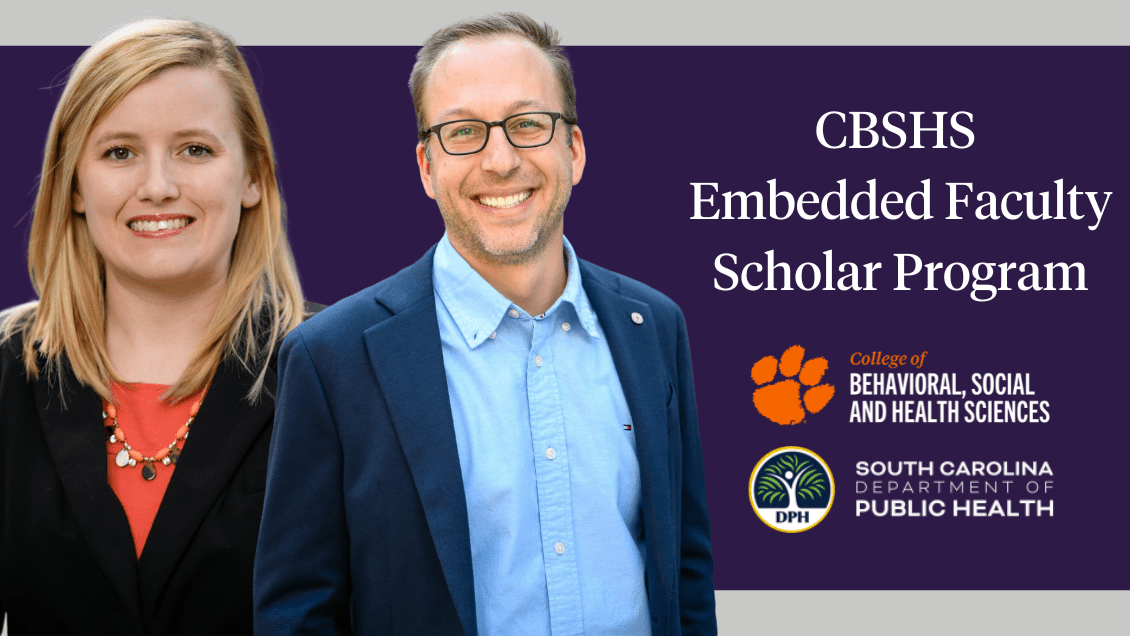The College of Behavioral, Social and Health Sciences (CBSHS) has developed an Embedded Faculty Scholar Program in partnership with the South Carolina Department of Public Health (SCDPH). The program will provide research support for SCDPH and offer CBSHS faculty members with invaluable field experience and research opportunities.
Interdisciplinary faculty scholars will engage with public health challenges in South Carolina, build and strengthen professional relationships with public health practitioners and policymakers, receive access to real-time public health data and case studies to enrich research and academic outputs and participate in professional development opportunities.
The program will be led by Lior Rennert, CBSHS associate dean for health sciences, and Dr. Edward Simmer, SCDPH interim director.
“As CBSHS continues to prioritize the goals of Clemson Elevate and engage in partnerships and programs to transform lives throughout South Carolina, we are identifying opportunities to advance scholarship and serve people and communities throughout the state,” said Rennert. “The CBSHS Embedded Scholars Program provides a unique opportunity for faculty members to experience and address critical health challenges in South Carolina through immersive collaboration.”
“The South Carolina Department of Public Health greatly appreciates our collaboration with CBSHS, which not only benefits both institutions, but most importantly, the people of South Carolina we serve,” Simmer said. “We are very excited to have Dr. Ash and Dr. Witrick working with us through the Embedded Scholars Program. These recognized experts in public health will provide us very valuable experience – and as our staff learns and develops, Drs. Ash and Witrick will learn more about public health issues in our state.”
Inaugural CBSHS Embedded Faculty Scholars include:
Erin Ash, Ph.D., associate professor in the Department of Communication
Ash’s research expertise in reproductive health misinformation, the role of media in pregnancy prevention efforts and stigma communication supports SCDPH goals related to family planning and reproductive health, as well as the goals of CBSHS and Clemson Elevate to transform lives statewide and beyond.

Ash said her goal as an embedded scholar is to support communication and health care practitioners and empower young people to make informed decisions about their reproductive health, including unplanned pregnancy prevention. Her specific interests include the role of media on young adult women’s contraception knowledge and decision-making and other reproductive health outcomes and disparities. She will investigate how social media use influences knowledge, attitudes and behaviors related to reproductive health and how it can be leveraged for positive health outcomes, especially among at-risk groups. Ash will identify contraception misinformation and develop and test strategies to combat its circulation. Additionally, she plans to develop media literacy curricula and campaigns to engage teens, providers and communities in support of current SCDPH initiatives.
Recently, Ash participated in a project funded by the Media Forensics Hub to understand how contraceptive methods are discussed on TikTok. She also conducts outreach to health care practitioners and nonprofit organizations statewide.
Ash holds a Ph.D. in mass communications and a master’s degree in media studies from Pennsylvania State University and a bachelor’s degree in communication from the College of Charleston.
Brian Witrick, Ph.D., assistant professor in the Department of Public Health Sciences
Witrick’s research expertise in epidemiology, spatial analysis and health disparities aligns with both the College’s mission to build people and communities and the immediate and long-term priorities of SCDPH.

In this role, Witrick said he looks forward to working with practitioners in the field to gain front-line experience and further synergize CBSHS and SCDPH efforts to address health care needs throughout the state. His specific interests include improving the understanding of drivers behind chronic heart disease and diabetes and developing insights for actionable public health interventions. Ultimately, he plans to work with SCDPH to develop targeted health policies and improve clinical outcomes for individuals and communities across South Carolina.
In CBSHS, he currently serves as a spatial epidemiologist and GIS expert on a Centers for Disease Control and Prevention (CDC)-funded project to develop infectious disease decision-making support toolkits to improve communication with public health organizations statewide.
Witrick holds a Ph.D. and master’s degree in applied health research and evaluation from Clemson University. He holds a Master of Public Health in epidemiology from Armstrong Atlantic State University and a bachelor’s degree in social studies education from the University of Georgia.
“This program is a testament to the strong partnership between CBSHS and SCDPH and our collective vision for the people and communities of South Carolina,” said Leslie Hossfeld, CBSHS dean. “I am confident our faculty members will receive invaluable front-line experience, and their interdisciplinary scholarship and expertise will advance the mission of the College to build people and communities and SCDPH to protect, promote and improve the health and well-being of South Carolinians for years to come.”
The College of Behavioral, Social and Health Sciences (CBSHS) was established in July 2016. CBSHS is a 21st-century, land-grant college that combines work in nine disciplines – communication; nursing; parks, recreation and tourism management; political science; psychology; public health sciences; sociology, anthropology and criminal justice – to further its mission of “building people and communities” in South Carolina and beyond.
The South Carolina Department of Public Health (DPH) was created by the state legislature with Act 60 in 2023. It is the public health component of the agency formerly known as DHEC. The agency officially launched on July 1, 2024. DPH is charged with protecting, promoting and improving the health and well-being of everyone in South Carolina. With more than 2,500 employees working in approximately 90 locations across the state, DPH instills a people-first approach to all that we do. Learn more about us at dph.sc.gov.
Get in touch and we will connect you with the author or another expert.
Or email us at news@clemson.edu

